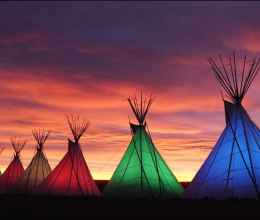Click here for information about Indigenous Justice rights and the 2025 Montana legislature.
We seek to uplift Indigenous people, communities and tribes through community-directed and integrated legal and advocacy work. We aim to support tribal communities -- and follow their lead -- as they work to uphold their sovereignty, dignity, and autonomy. We work to dismantle colonial systems of oppression that are found in all of our institutions including schools and prisons.
Montana is home to seven Indian reservations and 12 federally recognized tribes. Indigenous people -- about 6.5 percent of the population in the state -- are the largest minority group in Montana.
State and federal governments have never adequately addressed how the legacy of colonization continues to harm Indigenous people. Since the founding of the United States, Indigenous people have faced systemic injustice and inequality in all aspects of our society.
The ACLU of Montana recognizes that Indigenous Justice is not racial justice alone, but a complexity of political and sovereignty issues.
Our Indigenous Justice priorities are informed by conversations with Indigenous leaders and community members across the state, with Education Equity as our top priority.
Education Equity
Montana’s education system must address historic and current discrimination against Indigenous people and other people of color, and create a fair and inclusive learning environment in which all cultures are valued and all students have support and access to equal learning opportunities. Learn more.
Keystone XL Pipeline Construction
Alongside directly impacted communities, the ACLU of Montana joins in solidarity in opposing the construction of the Keystone XL Pipeline. Learn more.
Criminal Legal Reform
Indigenous people are overrepresented in Montana’s prison system. Indigenous adults in Montana are incarcerated five times the rate of white adults. For those caught up in the probation and parole system, Indigenous people are more likely to be put back in prison due to a technical violation, and less likely to have access to services -- like mental health or substance use disorder treatment, housing, or reentry services --that would help them successfully reintegrate into their communities. Learn more.
Voting Rights
Indigenous people must have political equality and fair access to the ballot box. But in reality, far too many people, especially living in rural parts of Indian reservations, face voter suppression or disenfranchisement. Learn more.
Free Speech
At Standing Rock, the government trampled on the free speech rights of Indigenous and other protestors. Quashing free speech rights, especially for minorities or other marginalized people, is all too common. We work to protect the free speech of Indigenous and other communities. Learn more.
Treaty Rights
Treaties between Indian tribes and the United States government are contracts between two sovereign nations. Per the U.S. Constitution, treaties are the law of the land. Even with an obligation to uphold all treaties, the federal government’s track record is dismal. We support tribes in their efforts to hold the U.S. government accountable. Learn more.
When it comes to Indigenous Justice, the ACLU of Montana is proud to have a dedicated Indigenous Justice program and be a leader within the national family of ACLU affiliates.






